Hello new year, new bookshelf. We recommend adding these page turners to your list of resolutions.

1. MUCUS IN MY PINEAL GLAND by Juliana Huxtable
IF HISTORY WAS ROBBED, WE TAKE IT BACK BY PEELING AWAY AT LAYERS OF WIKIPEDIA DEBATES (SUBJECT LINE) RE: AUTHENTICITY.
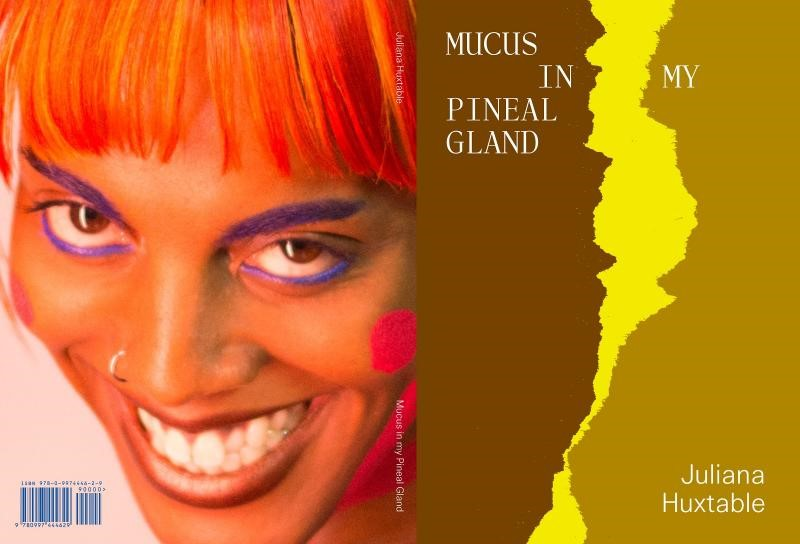
The Gist: Trans Brooklyn DJ and artist Juliana Huxtable’s debut poetry collection (re)mixes imaginative poems, performance scripts, and essays critiquing gender, sexuality, politics, whiteness, and history. Scratch the record: don’t miss this party.
The Buzz: “Mucus in my Pineal Gland, published by the arthouse press WONDER, is an amalgamation of poetry, performance texts and essays. Innovation abounds, and Huxtable not only sprawls inside her pieces, but across them.” — OUT magazine
Get it from: Wonder
2. ELECTRIC ARCHES by Eve Ewing
The work of the poet is not unlike the work of being black.
Some days it is no work at all: only ease, cascading victory,
the plentitude of joy and questions and delights and curiosities,
Other days, you wonder if exile would be too lonely
and figure it can’t be worse than thinking you won’t make it home
the fear of your own teeth skidding across the ice.
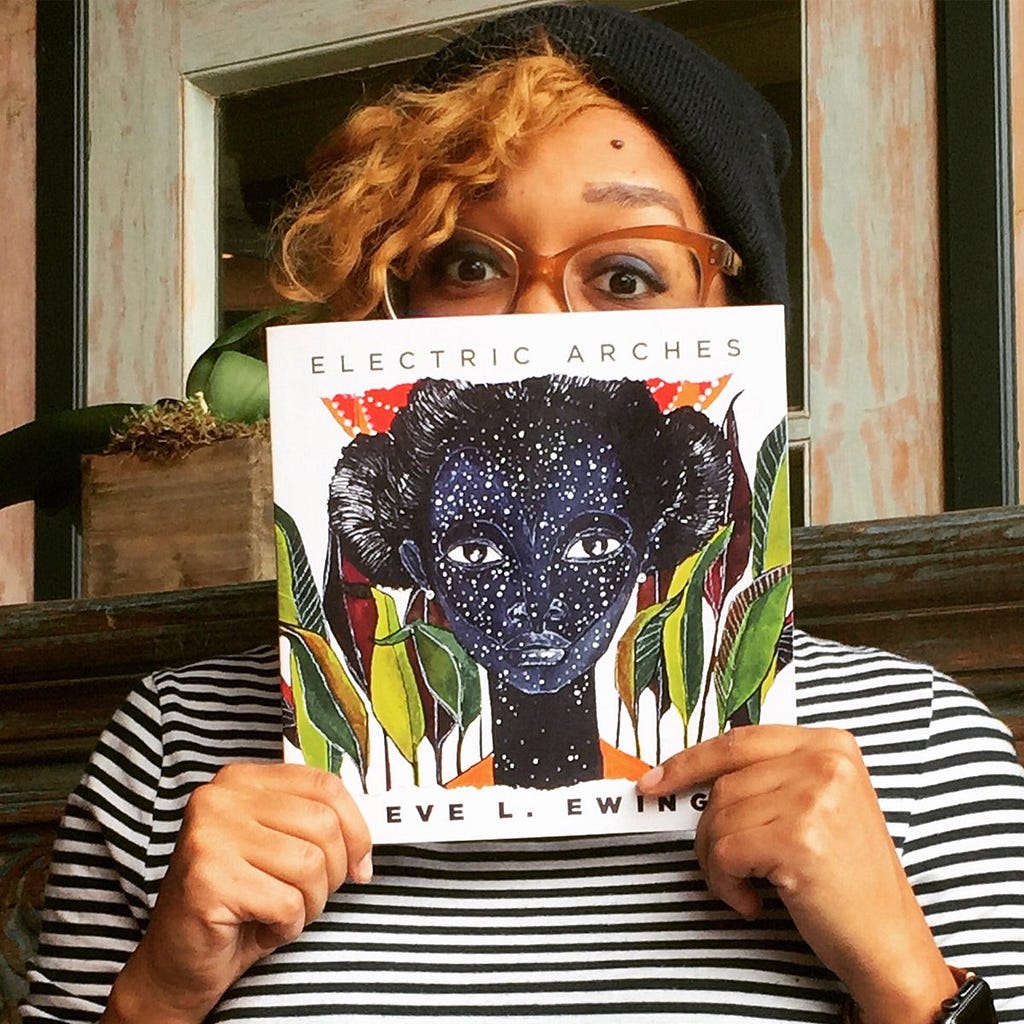
The gist: Chicago Review of Books named Ewing’s electrifying hybrid-genre debut the Best Poetry Book of 2017. Take Ava DuVernay’s word for it — this Afrofuturist exploration of Black girlhood and womanhood is: “Exquisite.”
The buzz: “Reading Eve L. Ewing’s Electric Arches is such an awakening and active experience — this book time travels, makes myth, immerses, paints, opens pathways. This is a living and breathing document, memoir and map, guidebook and scroll... I’m awestruck by the rigor and intimacy of this book, by its insistent love for both black past and black future.”–Morgan Parker, author of There Are More Beautiful Things Than Beyoncé
Get it from: Haymarket Books
3. DEATH BY SEX MACHINE by Franny Choi
i’m the menace. i’m the menace.
i’m the mother of stink.
question: how does a ruined girl yield
the way a knight yields? whose pipeline am i blowing
up, exactly?
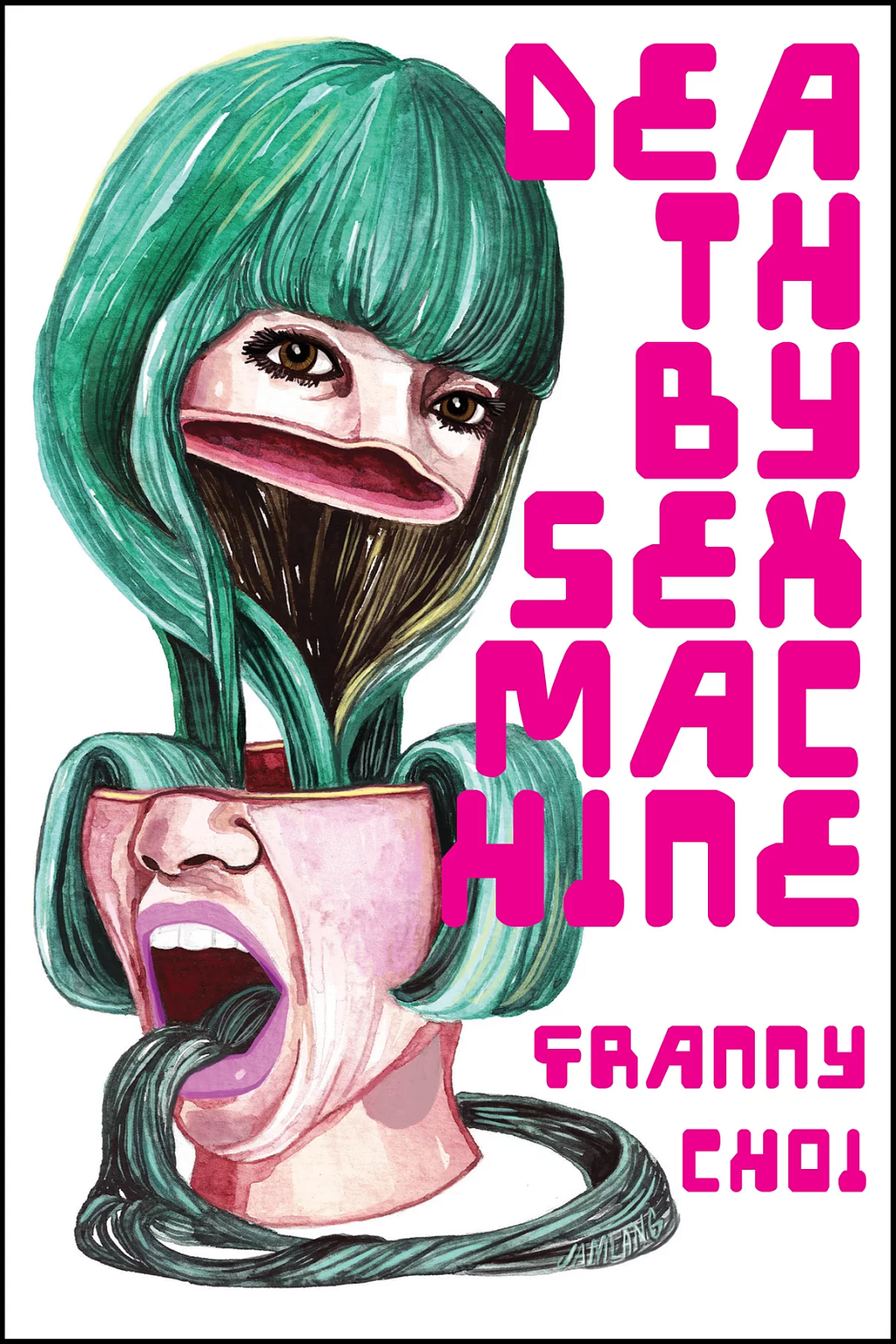
The gist: Ghostly android lyric is on the menu tonight. Like Floating, Brilliant, Gone, Choi’s new chapbook exudes exuberance with a side serving of horror. Patriarchy, beware: “LOL! / This bitch is a full stop.”
The buzz: “As in the uncanny valley, where we are spooked by machines being a bit too human, but not perfect replica, this tightly controlled chapbook probes the uncomfortable terrain of the familiar but not quite safe. Still, below that troubling surface, the ghost in these machines has more to do with parallel language — absconded language, verbal attack, stutter. It’s as if only she understands their spoken code, and the rest of us need translation. These lyric, blunt, and beautifully sheroic poems serve as cyborg rosetta.” — francine j. harris, author of play dead
Get it from: Sibling Rivalry Press
4. CADAVERS by Néstor Perlongher, translated by Roberto Echavarren and Donald Wellman
En el decaer de esta escritura
En el borroneo de esas inscripciones
En el difuminar de estas leyendas
En las conversaciones de lesbianas que se muestran la marca de la liga,
En ese puño elástico,
Hay Cadáveres.
In the collapse of this writing
In the blurring of those inscriptions
In the blending of these legends
In the conversations of lesbians who display the marks left by their garters,
In that elastic fist,
There Are Cadavers.
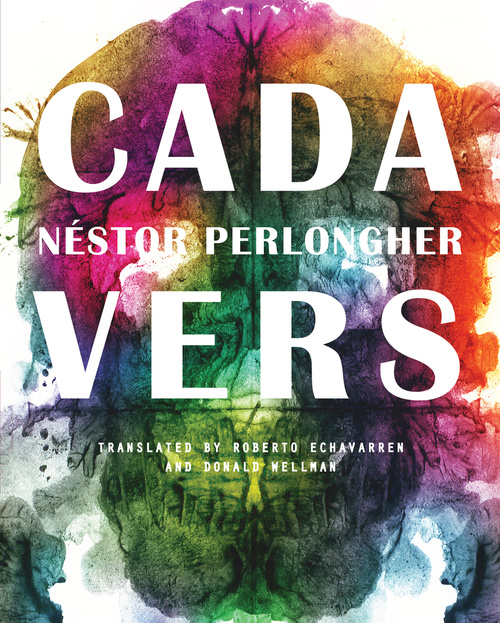
The gist: A gorgeous new bilingual edition of Argentine poet and gay rights activist Néstor Perlongher’s Cadavers, translated movingly by Roberto Echavarren and Donald Wellman. Written, as legend has it, on his long bus ride into exile, Perlongher’s great long poem pays tribute to the desaparecidos of Argentina’s Dirty War.
The buzz: “La Loca whose queer opulence shatters categories and the liberating projects these prescribe, la Loca whose opulence citizens violate so as to constitute the very idea of citizenship, esta es la Loca whose opulence finds form in the life and work of Néstor Perlongher to sing Argentina its most proper public hymn. Cadavers in the streets, in the crotches, in the words, and in military helicopters about to be tossed — so goes a haunting toward ‘the preciseness of this absence.’ To meet it, Perlongher lifts its perfect shadow in his mouth out of the ground.”— Farid Matuk, author of This Isa Nice Neighborhood
Get it from: Cardboard House Press
5. BLACK AND BLUR by Fred Moten
Black art neither sutures nor is sutured to trauma. There’s no remembering, no hearing. There is, rather, a perpetual cutting, a constancy of expansive and enfolding rupture and wound, a rewind that tends to exhaust the metaphysics upon which the idea of redress is grounded.

The gist: The first in Moten’s critical trilogy consent not to be a single being falls somewhere between jazz and philosophy. This book promises to be an intervention in the fields of black visual arts and performance studies — and a sheer revelation for all of us.
The buzz: “Poetry and philosophy can’t convincingly be condensed or speeded up. To feel each fully they must be read and sounded in time. Such is the case with Fred Moten’s words. Black and Blur allows and opens this feeling-mind-sense-body splitting possibility, in its stunning and generative appositionality of aesthetics and life. An intertwined, journeying flight, examining and composing variegations distinctly, yet together placed to read and imbibe. Beautiful, sobering, intricately pleasurable, delicious, and necessary as a way to now begin again delving into the specific immense variegated borderless blur of black that is profound, wide, and bittersweet.” — Renée Green, author of Other Planes of There
Get it from: Duke University Press
6. WHAT ABOUT THE REST OF YOUR LIFE by Sung Yim
Trauma doesn’t occur in a vacuum. You don’t outgrow it with time. It grows with you, even if the growing goes all wrong. It’s like breaking an arm and never putting it in a cast. You’re bigger, but the bone is still broken.

The gist: Sung Yim’s memoir transcribes the familial and interpersonal violence they faced in the Chicago suburbs at the blurred crosshairs between love and abuse. A notable debut, capturing self-loathing and structural critique: always unapologetic, always astonishing.
The buzz: “Never before has a book made me fall in love so quickly. What About the Rest of Your Life signals a courageous, crucial, and authentic new voice in literature.” — Jenny Boully, author of The Body
Get it from: Perfect Day Books
7. BLUD by Rachel McKibbens
Listen: anything holy
is not reversible.
There isn’t a man alive
who could undo me.

The gist: Two-time New York Foundation for the Arts poetry fellow and activist Rachel McKibbens gifts us poems — nay, spells — testifying to survival in the face of mental illness and domestic abuse. Read our full review of it here.
The buzz: “Chicana poet, activist, and witchy folk hero of the disenfranchised. . . . [McKibbens] creates these spaces of witness with her feral and boundary-pushing poems that speak unflinchingly of topics often swept under the rug: rape, domestic violence, body shaming, mental illness, prejudice.”―Ploughshares
Get it from: Copper Canyon Press
8. FRUIT MANSION by Sam Herschel Wein
“Are you a fruit or not?” his hands
reached for my inner thigh, & I
(tried to) say, I’m
not ready
to be splattered seeds, I’m not
ready to pick or be picked.
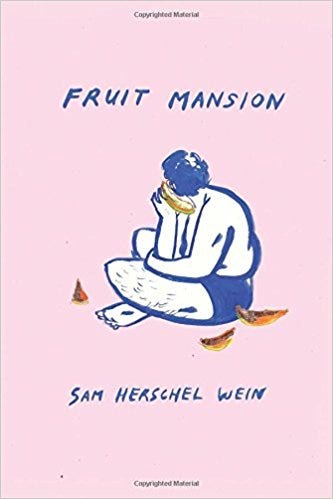
The gist: This debut chapbook from Sam Herschel Wein, a co-founder of Underblong Journal, won the 2017 Turnbuckle Chapbook prize.
The buzz: “To enter Sam Herschel Wein’s Fruit Mansion is to fall headfirst into a hungry labyrinth, a juicy ‘[g]eometry of bodies.’ Queer morsels of citrus light romp here. Unruly fistfuls of spaghetti reign here. The speakers are eaters and double-dipping skinny-dippers, bitter saliva-knowers and sweet hairy secret-sharers. In every ‘stairwell of your love,’ these poems are world-kissers. These wet, arugula-peppery words talk back to straight roommates, concerned family members, boys with boundary issues, and a self steeped in the lonely shame of desiring the wrong, the too-much. I cried, I laughed…” — Chen Chen, author of When I Grow Up I Want to Be a List of Further Possibilities”
Get it from: Split Lip Press
9. THE ODYSSEY translated by Emily WIlson
Now goddess, child of Zeus,
tell the old story for our modern times. Find the beginning.
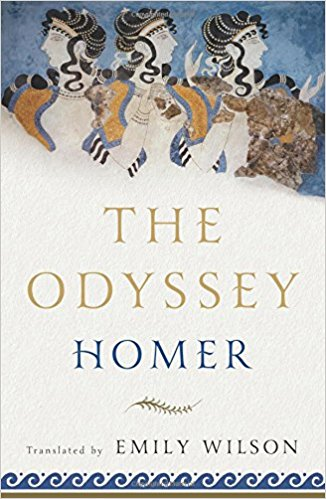
The gist: Emily Wilson’s new version is the first (and long overdue) English translation by a woman. As Wilson reflected in a New Yorker article, “I read Homer’s great poem as a complex and truthful articulation of gender dynamics that continue to haunt us. The Odyssey traces deep male fears about female power, and it shows the terrible damage done to women, and perhaps also to men, by the androcentric social structures that keep us silent and constrained.”
The buzz: “Having a female scholar and translator look with fresh eyes upon one of the foundational myths of Western civilization is nothing short of revolutionary. Emily Wilson’s riveting translation of The Odyssey ripples with excitement and new meaning. This important and timely addition to our understanding of Homer will be enjoyed for generations to come.” — Aline Ohanesian, author of Orhan’s Inheritance
Get it from: WW Norton
10. ACKER by Douglas Martin
Let yourself come out, let yourself mingle with the other “I”s on the page. Wonder: who is ever going to be able to tell the difference, where you begin and end.

The Gist: Spunky miniature lyric essays paying homage to feminist new narrative author Kathy Acker. As delightfully unhinged as an Acker novel, Martin’s close readings of “my author” reward patient attention with verve.
The buzz: “Douglas A. Martin’s Acker is exactly the kind of literary criticism I want to read right now: an open-ended yet utterly thorough record of one deft, curious, intrepid mind beholding another. Personal when he needs to be and clinical when his investigation calls for it, Martin acts as the perfect counterpoint to Acker’s all caps bombast.” — Maggie Nelson
Get it from: Nightboat Books
Books To Watch Out For — January 2018 was originally published in Anomaly on Medium, where people are continuing the conversation by highlighting and responding to this story.
